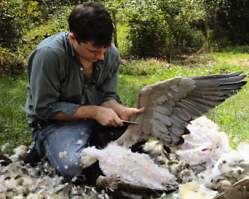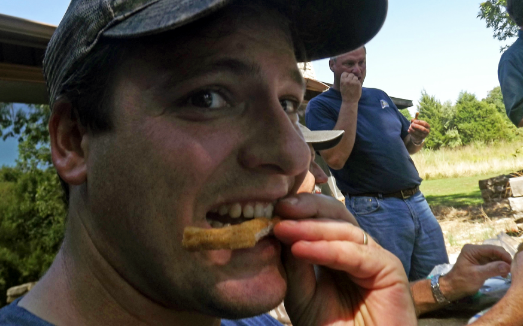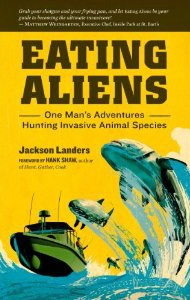
Jackson Landers removes the feathers from a Canada goose.
The notion of eating invasive species has gained traction among hunters, eaters, and chefs embedded in the food movement in recent years. Whether it’s iguanas in Florida, lionfish off the Atlantic coast, or plants that have long been considered weeds, ethical eaters, the thinking goes, can chow down in good conscience, secure in the knowledge that with every bite, they’re helping to remove an unwanted animal from the ecosystem. Jackson Landers, a hunting instructor and author based in Virginia, has been championing this idea for years. His latest book Eating Aliens: One Man’s Adventures Hunting Invasive Animal Species offers a gourmand’s guide to hunting and eating these unwanted plants and animals, taking aim at feral boars, Asian carp, and other creatures incurring an outsized impact on the landscape with hefty appetites for destruction.
We spoke with Landers recently about his book, federal regulations on wild foods, and the stench of the nine-banded armadillo.
Q. What inspired you to write Eating Aliens?
A. After completing the draft of my first book [The Beginner’s Guide to Hunting Deer for Food], I started looking around for another project that would utilize my skills as a hunter, writer, and educator in a positive way. A lot of people are doing great work on climate change and habitat loss, but with invasive species not only was there a lack of awareness, but there are few people doing anything about it. Eating Aliens is Douglas Adams’ travelogue Last Chance to See in reverse. Instead of setting out to find the most rare and endangered species existing in the world in need of protection, I set out to look for the most dangerously overpopulated species that don’t belong in the United States and need to be removed.
Q. You grew up in a vegetarian household. Given the premise of the book, how did you get over the hump?
A. Gradually, between the ages of 10 and 12, I went to other people’s houses and had chances to eat meat and discovered that I liked it. At some point, my parents stopped being vegetarians — eating turkey for Thanksgiving and burgers for Fourth of July. I think it was a shock for them when I first started hunting. But the reasons as to why people like my parents became vegetarians are entirely consistent with my values. In the ’70s, people wanted to know where their food came from, and raised questions about the relationship between our diet, our bodies, and society. More recently, the intellectual center of the food movement has shifted to be more about ethically sourcing meat. My parents understand that.
Q. Why does the idea of hunting invasive species resonate with you?
A. There are so many people right now who have meat-eater’s remorse — people who eat meat and feel kind of bad about it, but they’re not actually going to stop. Or they’re vegetarians and their bodies actually crave meat. But there’s so much awareness about what’s wrong with the mainstream food system — and they haven’t known what to do about that. The beautiful thing about hunting, especially invasive species, is it’s a way of dropping out of the mainstream meat paradigm, where so many of the ethical and health problems associated with eating meat arise.
Also, I’m a firm believer that humans evolved as omnivores that seasonally ate quite a lot of meat. Our bodies and minds have evolved to respond positively to hunting. There’s an instinct to hunt that’s a part of us. We haven’t been leading an urban lifestyle long enough to have physically evolved way from that yet. People want to feel active about getting food from the land without relying on someone else.
Q. How do you define an invasive species as opposed to the annoying or pesky ones?
A. My definition of an invasive species would be a species physically moved from a place in the world where it has traditionally existed into a new habitat — usually by human beings. In this new habitat they are increasing in their numbers and range. I hunt white-tailed deer in my home state of Virginia all the time. Is it overpopulated? Is it a nuisance species? Yes, but it’s still native. Just because a species is annoying doesn’t make it invasive.
Q. In the course of researching the book, was there was ever a point where you said to yourself, “never again”?
A. Usually when conditions were difficult and it was taking a long time to get something, it was because I was learning how to hunt it. I don’t mind physical hardship in the outdoors. The surprising thing is nothing I ate while working on Eating Aliens really tasted bad. That said, nine-banded armadillos have a funk to them. I have this scent memory of stinky armadillo belly that’s going to haunt me. But I don’t think that should prevent people from eating armadillos that other people have hunted.
Q. Local and federal agencies seem to be divided on this issue. How is conservation reconciled with food safety? For example, should we hunt species like feral boar rooting in spinach fields?
A. The [U.S. Department of Agriculture] doesn’t really care if hunters are out in spinach fields shooting feral boar. The [Food and Drug Administration] has more of a problem in that regard. Because whenever federal regulations come into play involving the sale of meat across state lines, it has to be slaughtered and processed in an approved slaughterhouse — which is kind of ridiculous. In Europe, wild game can be killed in the field, brought to the butcher, cut up, and sold. It’s not like big E. coli or brucellosis outbreaks are happening; they’ve been doing this in Europe for over 100 years with good science behind it. There’s no special food safety danger with regards to selling the meat of animals that have been killed in the field, which is to say on a hunt.
Q. So why can’t you buy a venison burger at McDonald’s?
A. Deer are a designated game species. Agencies don’t want to see it monetized, which would incentivize the taking of wild game. That said, I think there’s tremendous market potential with regard to invasive species. I think that could be done with wild pigs — trapping boar, slaughtering them, processing that meat, and selling the pork at local farmers markets.




